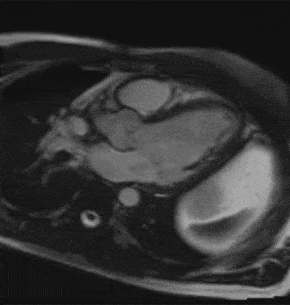Cardiac MRI Scan
Magnetic resonance imaging (MRI) is a highly sophisticated technique with numerous medical applications, however only recently has it proved especially useful for investigating cardiac problems. Unlike conventional X-rays, CT scans and coronary angiograms, there is no radiation involved in the process; instead MRI uses a very powerful magnetic field to produce images of the heart. CMR can evaluate multiple aspects of the heart, including structure, function and blood supply to the heart.
Preparing for the scan
For the scan the patient will need to change into a gown and remove all jewellery and any magnetic items, including hearing aids; they will also need to complete a screening questionnaire to check for magnetic implants that would preclude the scan. Most metal implants are MRI-compatible but there are some important contraindications, such as cochlear implants and clips for aneurysms in the brain – in part it will depend on the type and position of the implant, whether it is magnetic, and the strength of the magnet used in the scanner. All coronary stents and metal heart valve replacements are MRI-compatible, and implantable loop recorders (such as the Reveal LINQ device) should have their data downloaded prior to the scan. It is now possible to conduct cardiac MRI scans on patients with pacemakers and implantable cardioverter-defibrillators (ICDs) with very careful supervision at specialist cardiac MRI centres. Most medication can be taken as normal, however if a patient is taking Persantin (Dipyridamole) or Theophylline, or has bad asthma, they should let the centre know prior to their visit.
It is very important that caffeine is not consumed in the 24 hours before the scan. Caffeine is found in more food, drink and medicines than one might think, and we have listed some of these below. The patient can otherwise eat and drink as normal.
| Food | Caffeine (mg/100ml) | Medicine | Caffeine (mg/pill) |
| Dark Chocolate | 71.4 | Panadol Extra | 65 |
| Milk Chocolate | 21.4 | Solpadeine Plus | 30 |
| Chocolate Cereal | 3 | Benylin Cold and ‘Flu | 25 |
| Drink | Caffeine (mg/100ml) | Drink | Caffeine(mg/100ml) |
| Espresso | 173.6 | Pepsi | 10.7 |
| Fresh Coffee | 45.4 | Green Tea | 10.6 |
| Red Bull | 32 | Diet Pepsi | 10.1 |
| Monster | 32 | Coca Cola | 9.7 |
| Instant Coffee | 24.1 | Chocolate SlimFast | 8.4 |
| Tea | 19.9 | Hot Chocolate | 3.8 |
| Diet Coke | 12.7 | Lipton Iced Tea | 2.8 |
| Lucozade | 12.1 | Decaf Coffee | 2.4 |
| Dr Pepper | 11.8 | Cocoa | 2.1 |
Before going in to the MRI scanner, the patient should make sure that they are not wearing or carrying any of the following:
Watch
Mobile phone
Magnetic swipe cards (credit/entry cards, travel cards, rail tickets)
Jewellery
Any loose metallic objects (e.g. coins, hair grips)
During the scan
During the scan the patient will lie on a moveable examination table, which then slides inside the scanner. The scanner tube is longer and narrower than a CT scanner but it is well lit and open at each end to help minimise any claustrophobia. As the images are acquired the scanner makes a loud knocking noise and headphones with music are provided to minimise this. The scan takes around 45 minutes, during which the patient will need to lie still. Some imaging sequences require breath holds for about 10 seconds whilst images are being taken, and for some scans an injection of a substance called gadolinium is required which, unlike many other contrast agents, does not contain iodine, which some people are allergic to. If the blood supply to the heart is also being assessed (a perfusion scan) an infusion of a drug such as adenosine will be administered to speed up the heart and simulate stress. The infusion may cause some chest tightness and flushing, but this is perfectly normal and only lasts about 3 minutes. The patient will be told when to expect this during the scan.
After the scan
After the scan the patient is free to return to their normal daily activities immediately.

Related links:
Symptoms - Breathlessness and Fluid
Retention
Breathlessness, or dyspnoea, is a common symptom of several medical disorders. Read more
Symptoms - Chest Pain
Chest pain has a variety of causes, one of the most important of course being pain from the heart. Read more
Conditions - Coronary artery disease and
angina
Coronary artery disease is the term given to soft fatty deposits or hard calcified plaques within one or more of the coronary arteries, the vessels which supply blood to the heart. Read more
Conditions - Cardiomyopathy
Tests - Coronary Angiogram
Coronary angiography, also called cardiac catheterisation, is a sophisticated test undertaken by an interventional cardiologist as a day case in hospital, which allows the doctor to obtain detailed information about the coronary arteries, and the extent and severity of any disease within them. Read more